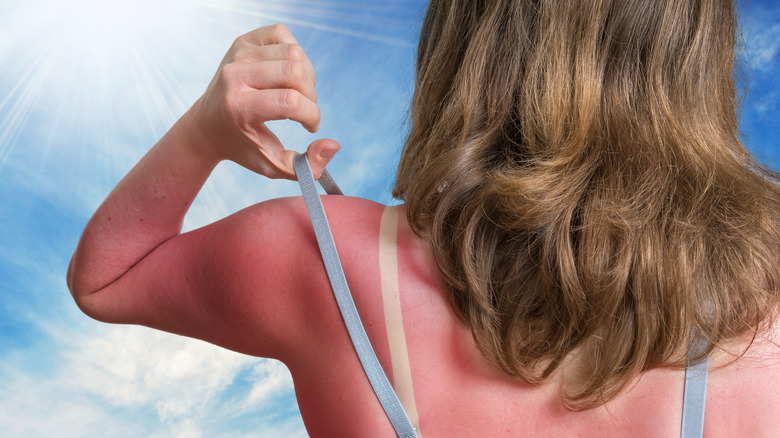Strange Ways The Sun Can Affect Your Health
The sun has been a source of wonder and fascination since the dawn of humanity. This huge spinning star is pivotal to the existence of life on Earth: It provides us with light, keeps us warm, and helps plants and animals survive and grow (via National Geographic). Civilizations have harnessed its solar energy for thousands of years. As a powerful and omnipresent force in our cosmic system, it's no surprise that the sun has been deified over the course of history, serving as a potent symbol of wisdom in many cultures, from Paganism to Indian mythology to Native American spirituality (via Britannica).
The belief in the sun's curative properties has spanned centuries. Hippocrates, the Greek physician known as the "father of medicine," recommended sunbathing for various ailments, and had his own solarium to treat his patients, while the Roman philosopher Pliny once wrote: "Sun is the best remedy" (via Canadian Family Physician). In the early 20th century, the discovery of vitamin D (often referred to as the "sunshine vitamin") and how ultraviolet light promotes its synthesis in the skin was a huge step toward modern science recognizing the sun's health-promoting powers (via BoneKEy Reports).
But like Apollo — the "god of the sun" in Greco-Roman mythology — this mysterious celestial body has the capacity to both heal and harm us, warn scientists (via Environmental Health Perspectives). Here are some strange (and perhaps not-so-strange) ways the sun can impact your health.
It helps keep depression at bay
As far back as the first century, Roman philosopher Aulus Cornelius Celsus wrote in his medical treatise, De Medicina, that people suffering from "melancholia" (known today as depression) might benefit from being in well-lit spaces (via Canadian Family Physician). The idea that sunshine can nurture our mental health persists today. Seasonal Affective Disorder (SAD), also known as the "winter blues," is identified as a type of depression that's brought on by shorter daylight hours in the autumn and winter (via ScienceDirect).
Sunshine can raise our levels of serotonin — the brain's "happy" neurotransmitter responsible for regulating our emotions and calming our nerves, explain researchers (via Innovations in Clinical Neuroscience). When sunlight enters the eyes, it stimulates the retina, which signals the brain to release serotonin — and it's been suggested that the skin has "serotonergic machinery that may also perform this task." There's evidence that people produce more serotonin on sunny days compared to cloudy ones, irrespective of how cold or warm it is, and "light therapy" has been shown to have antidepressant effects due to its ability to modulate serotonin (via Lancet and Neuroscience Bulletin).
When your skin is laid bare to the sun's ultraviolet rays, Vitamin D is churned out via an intricate chemical process (via National Geographic). A 2020 review study found that low levels of vitamin D are generally associated with a greater risk of depression — though its role in the pathophysiology and treatment of depression needs further research.
It regulates your sleep-wake cycle
A sunny day can uplift your mood in more ways than one. Getting an ample supply of sunlight throughout the day can help you nod off better at night, indicates research, which is naturally a key factor in feeling and functioning well (via Anticancer Research). This is because your circadian rhythm — your body's internal clock — follows the sun's patterns, and sunlight sends signals to your brain about when it's time to go to wake or sleep. When the sun's blue light rays enter your eyes, it slows or halts the production of melatonin, which is a hormone that helps us sleep better. In this way, the sun promotes wakefulness during the day. Melatonin levels typically rise again in the evening as the sky darkens, preparing the body for sleep (Sleep Foundation). But when the body's circadian rhythm is disrupted, melatonin can peak earlier or later than usual, throwing your normal sleep pattern off-balance. This might explain why people often feel more tired and groggy during the darker seasons, yet we tend to sleep like a baby after a lazy day in the sun.
There's intriguing evidence that people with vitamin D deficiency struggle with sleep disorders: They sleep fewer hours, have poor quality sleep, and frequently feel drowsy (via Nutrients). Some doctors recommend vitamin D supplementation to help improve sleep quality, however, the authors of the 2018 meta-analysis point out that further research is needed to investigate whether supplementation is an adequate replacement for sufficiently sun-exposed skin. So, don't forget to pull those curtains open first thing in the morning and let the light in.
It can generate feelings of euphoria
If you've ever felt a bit "high" while basking in the sun, it's possible that you weren't imagining it. Exposure to ultraviolet light yields pleasurable sensations, according to research carried out by the Wake Forest University Baptist Medical Center. They found that people who frequently use tanning beds — which artificially emit UV radiation — report feelings of wellbeing that keep them going back for more, including a "more relaxed" and "less tense" mood. UV light releases endorphins in the brain. These "feel-good" chemicals can make us feel euphoric, but they also play a role in the brain's reward system, which may underlie the addictive medical condition known as "tanorexia," where people become obsessed with tanning to the point of causing themselves harm (via Huff Post).
More specifically, research has shown that UV rays increase beta-endorphin — the body's natural pain-killer, which has strong pleasure-inducing and analgesic effects. The production of beta-endorphins in the skin raises levels of endorphins in the blood, which then interact with the brain's opiate receptors, acting on the same reward pathway as opioid drugs. A similar process occurs during a "runner's high," which might explain why so many of us find sunbathing so satisfying and hard to resist (via Anticancer Research). "It is possible that a natural mechanism reinforcing UV-seeking behavior may have developed at certain stages of mammalian evolution through its contribution to the synthesis of vitamin D," David E. Fisher, one of the study authors, told Harvard Medical School.
It could protect you from developing the flu
The sun has long been revered for its medicinal prowess (via Medical History). In the early 20th century, sunlight therapy, also known as heliotherapy, was used to treat a number of different conditions including tuberculosis, rickets, and wounds, while many hospitals and sanitariums were built with south-east-oriented windows to ensure that patients could get sufficient sun exposure.
The belief that sunlight can promote a strong immune system is backed up by science today, which has found that exposure can help protect against the flu (via National Bureau of Economic Research). More recently, a study found that the rates of COVID-19 infections and deaths were higher in countries where people had lower levels of vitamin D (via Aging Clinical and Experimental Research). One explanation for this is that vitamin D deficiency impairs the development of "macrophages," which are white blood cells that attack pathogens in the body, explain the study authors. It's also said that adequate levels of vitamin D can improve the expression of infection-fighting genes that strengthen immunity and help kill off bacteria (via Scientific Reports). Some researchers point out, however, that it's not just sunlight exposure, but also an individual's diet, behavior, and skin color that influence their vitamin D status (via European Journal of Endocrinology).
Interestingly, a 2016 study suggests that the sun's blue light rays can boost your immune system without the involvement of vitamin D. Specifically, sunlight may trigger the synthesis of hydrogen peroxide, which energizes and improves the motility of T-cells, making them respond faster to bacterial infections.
It might help boost your brain-power
Not only can sunshine help you beat the blues, but it may even have beneficial brain-boosting effects. When sunlight stimulates the skin, it triggers various chemical reactions that can enhance learning and memory, making you more intelligent, say researchers (via Cell). In particular, moderate exposure to UV light has been shown to improve cognition by increasing the production of glutamate — a chemical that functions as a neurotransmitter and excites neurons in the brain — though, the specific mechanism between UV radiation and the neural system remains unclear, admit the study authors.
Other studies point to the link between vitamin D deficiency and the development of neurological disorders like dementia and Alzheimer's disease (via BMC Geriatrics), while a 2018 study from the journal Maturitas showed that a regular dose of sunshine could help prevent cognitive decline in women as they get older. The researchers of the latter study examined women aged between 55-67 and concluded that sufficient vitamin D levels were generally paired with "better executive functioning in late-life, in particular, improved cognitive flexibility, attention, and psychomotor speed."
Vitamin D is "one lifestyle factor in a holistic view of protecting our brains as they age," Alicia Goodwill, lead author and an honorary fellow at the University of Melbourne's Department of Medicine, told the University of Melbourne's multi-media platform Pursuit, adding: "We're not saying it's a magic bullet or the magic sunshine. It's one potential factor."
It can cause acne and other skin problems
At a blistering 27 million degrees Fahrenheit (hotter than any lava from the Earth's volcanoes), the sun's flames help sustain life on our planet (via Live Science). Almost all living organisms depend on the sun's energy to stay alive. But as the saying goes: That which nourishes me destroys me (via In search of Christopher Marlowe: a pictorial biography). While a bit of sunshine can be healthy, there's no denying that UV radiation can be savage on your skin. Besides exacerbating ageing, the sun's rays can contribute to developing skin problems like acne, dark spots, and dry, irritated skin (via Acne Intelligence). This might occur in part due to dehydration. Additionally, the sun's UV light overstimulates the sebaceous glands, which produce naturally occurring oil that helps lubricate your skin and keep it supple. But when excess sebum is created, it irritates the outer layer of your skin and throws it off-kilter. The sun can also increase inflammation and cause post-inflammatory hyperpigmentation (discoloration), which may give rise to acne breakouts (via WebMD). Indeed, people often report a "summer aggravation" in humid and sweaty environments, as noted by a 2014 study (via The Journal of Dermatology).
Prolonged sun exposure can also bring about "solar comedones," which appear as bumpy, flesh-colored papules (via Healthline). These blemishes tend to crop up on the cheeks of middle-aged and older people, but they're also found on frequent sun dwellers or people working in outdoor jobs, such as builders and farmers.
It can affect your fertility
As far-fetched as it may sound, getting outside and soaking up the sun's glow can actually boost fertility, say scientists. Sunlight can up a woman's odds of becoming pregnant by a third, reported a 2016 study of IVF results monitored over six years. Women were 35% more likely to have successful IVF outcomes if they were exposed to sunny skies a month before they started treatment. Sunny weather was found to positively affect the number of eggs, rates of fertilization, pregnancy, and live births.
Vitamin D was pinpointed as a driving factor for enhanced fertility. The sunshine vitamin is said to drive up progesterone, estrogen, and estrone in the body, while facilitating a healthy uterine lining (via IntechOpen). The hormone melatonin might also play an important role, as it's believed to modulate the reproductive cycle. As an antioxidant, melatonin can help reverse oxidative damage to oocytes and improve both egg quality and the chances of conception — according to a 2019 study found that melatonin supplementation improved "oocyte quality" and yielded up to 30% higher pregnancy rates (via Antioxidants). But while the effects of melatonin on fertility are recognized, it's still poorly understood, admit researchers (via IntechOpen).
Other studies indicate that vitamin D might also improve male fertility — due to its assistance in calcium metabolism and homeostasis — supporting the healthy development, motility, and quality of semen (via IntechOpen).
It supports a healthy metabolism
Could sunshine be the answer to a fast and healthy metabolism? According to a study from the journal Scientific Reports, the sun's blue light rays may help shrink fat cells in the body, and in turn, aid weight loss and allow your metabolism to operate effectively. Some researchers chalk this up to vitamin D, which is naturally produced when the sun shines on our skin (via Healthline).
The study findings are reinforced by the fact that people tend to put on more weight in the darker, winter months. Night work also appears to have metabolic consequences, as reflected by a study published in 2020, which found that shift workers like nurses and midwives generally have higher BMIs than those who work in ordinary daytime jobs (via Diabetology & Metabolic Syndrome). People who work during the night produce less leptin, a hormone that sends a signal to your brain to let it know when it's time to stop eating (via PLoS ONE). They also have increased levels of cortisol and ghrelin — stress hormones that contribute to weight gain. What's more, individuals who change from working at night to working in the day have been found to lose weight.
It may cause -- or help prevent -- allergies
The sun can be a major cause of discomfort for people with an allergy to sunlight. A sun-related allergy that commonly occurs during the sunnier months is called "polymorphous light eruption," where people break out in a rash when their skin is exposed to UV light (via ScienceAlert). More rarely, sun exposure causes people with a condition known as "solar urticaria" to break out in hives. In a very severe case, sufferers can experience an anaphylactic shock (via Verywell Health). This reaction is caused by "immunoglobulin," which is an antibody that's also responsible for food and pollen allergies, reports ScienceAlert. Treatment often includes taking antihistamines or using a steroid cream to soothe the welts on the body.
But the sun can also bring relief to people grappling with allergies. A 2019 review study shed light on the connection between a lack of sunshine-induced vitamin D and food allergies (via Allergology International). The researchers explain that vitamin D has a number of positive effects that might help tackle allergic symptoms, including the ability to "induce antimicrobial peptides, protect intestinal flora, enhance the gut epithelial barrier, (and) suppress mast cell activation." Vitamin D is also implicated in the reduction of allergic rhinitis in children, based on a 2016 systematic review, and has been found to potentially play a role in lowering children's risk of developing eczema and allergies to peanut and egg (via The Journal of Allergy and Clinical Immunology).
It reduces your risk of developing cancer
Everyone knows that too much UV radiation can cause life-threatening skin cancer, but it turns out that the sun might actually help prevent other cancers. Research has shown that people residing in places with fewer daylight hours have a greater chance of developing cancer than those who live in a sunnier climates. After all, the sun is one of our main sources of vitamin D, which can have anti-inflammatory effects and slow down tumor progression (via JAMA Network Open). A 2016 review of the risks and benefits of the sun confirmed that this glowing entity can indeed significantly reduce the risk of cancer, which may "at least in part" be attributed to vitamin D. Once Vitamin D is concocted in the skin, it makes its way to the liver and kidneys via the blood, where it's converted to calcitriol — an active form of vitamin D — which has various vital functions in the body (via ScienceDirect).
Another 2014 study showed that people with vitamin D deficiency have a greater chance of dying from various types of cancer compared to people with adequate levels of it, and vitamin D produced by the sun appears to be far more potent than the version achieved by taking supplements (via The BMJ). Still, it's important to take care not to burn — the GrassrootsHealth Nutrient Research Institute recommends covering up or applying non-toxic sunscreen, and avoiding excess exposure during the hottest hours of the day.
It can cause skin cancer
Despite the sun's life-giving energy, baking under its rays for extended periods of time can potentially do more harm than good. Too much unprotected sun exposure can damage the DNA in the cells of your skin, eyes, and the immune system warns the American Cancer Society. It can also contribute to cancer. Getting sunburned once every two years triples your risk of developing skin cancer, though skin cancers can occur without sunburn, notes Cancer Research UK.
Melanoma is a type of skin cancer that develops in your melanocytes, which are the cells that produce melanin — the brown pigment that gives you your tan (via the American Cancer Society). According to a 2020 article published in the International Journal of Cancer, 91% of all cases of melanoma were caused by ultraviolet (UV) radiation, mostly obtained from the sun. "The amount of UV exposure you get depends on both the strength of the sun's rays — measured by the UV Index — and the length of the time your skin is exposed to it," Farhad Islami, the study's lead author, told the American Cancer Society. "You can't change the UV Index, but you can change how long you're outside and how you protect your skin," Islami added. Though anyone can be harmed by UV radiation, people with lighter skin are generally at a higher risk of burning, and therefore of developing skin cancer.
Moderate sun exposure may increase longevity
Yeah, you heard that right — sunlight may actually be an elixir for longevity. Sunbathers (who don't overdo it) get to live longer than those who shun the sun's rays as much as possible, reports a 2016 study. The researchers discovered that women who spent more time in the sun had longer lifespans — including less heart disease and fewer non-cancer deaths — than those who consistently avoided the sun. There are some important caveats, the authors note: Sun-goers lived somewhere between seven months to two years longer than those who stayed out of the sun, so the benefits of sunshine are relatively small in the grand scheme of things. Also, the impact of sunshine on longevity needs further investigation.
Another 2017 study revealed that mortality rates in the U.S. are 25% higher in the winter than in the summer. And although lighter-skinned people are more likely to develop skin cancer, people with darker skin are more prone to vitamin D deficiency — due to the melanin in their skin blocking the UV radiation that promotes vitamin D creation — and therefore are more likely to develop or die from a number of health conditions (via Nutrients). Additionally, a 2020 meta-analysis showed that melanoma patients with lower vitamin D levels had a 55% higher mortality rate (via the Journal of the European Academy of Dermatology & Venereology).
The general public health message of sun avoidance should be changed to encourage people to take measures to avoid sunburn instead, suggests a 2020 review study. For instance, they advise that people should be mindful of the time they spend outside during peak daylight hours.
It can both worsen and improve respiratory issues
"Annual epidemics of the common cold and influenza disease hit the human population like clockwork in the winter," notes a 2020 review study, alluding to the sun's ability to help modulate our immune health. But for people with respiratory issues like asthma, summer can be an equally challenging season. When the sun's ultraviolet rays collide with air pollution caused by nitrogen oxide emissions and other toxic chemicals like volatile organic compounds, it creates smog or ground-level ozone (via National Geographic). Research has shown that ozone can be extremely harmful to lung tissue, exacerbating asthma (via Environmental Research), but it can even provoke the nasal passageways and lungs of those without any respiratory issues, per the United States Environmental Protection Agency (EPA).
On the other hand, a bit of sunshine can work wonders for alleviating symptoms in some people with respiratory conditions. A 2014 study found that children with low levels of vitamin D were more likely to have asthma and other allergic diseases like allergic rhinitis and wheezing. And a 2021 review study lent support to these findings, highlighting the strong association between vitamin D deficiency and asthma attacks. The researchers found that vitamin D supplementation can help reduce the worsening of symptoms in adults, but they failed to find consistent evidence for its benefits in an older pediatric population.
It's good for your heart
Who would've thought that when UV light hits your skin, it can set off a domino health effect that extends to your heart? A 2020 study of 342,000 patients at dialysis clinics across the U.S. found that exposure to the sun resulted in lower blood pressure readings, irrespective of temperature. This is because sunlight triggers the release of "nitric oxide" from our blood vessels, explain the researchers. This powerful, endogenous compound relaxes your blood vessels and causes them to dilate, leading to lower blood pressure and driving down the risk of cardiovascular problems like a stroke, heart attack, heart failure, and peripheral arterial disease.
Other studies identify scarce levels of vitamin D as a potential contributing factor to poor heart health. As detailed by a 2019 review study, insufficient vitamin D might actually elevate blood pressure and increase people's risk of hypertension and heart disease. But the evidence for the relationship between the sunshine vitamin and cardiovascular risk is still in its infancy, says Erin Michos, director of the Johns Hopkins Women's Cardiovascular Health Center, per John Hopkins Medicine. Michos says, "We don't know for sure whether treating with vitamin D can prevent a heart attack" in quite the same way that we know that "vitamin D is good for the bones."
It might prevent arthritis
In recent years, the sun has been touted as a potential remedy for rheumatoid arthritis. A study of female nurses conducted between 1976 and 2009 found that women who had resided in sunnier parts of the U.S. were less likely to wind up with arthritis. The researchers credited ultraviolet B (UV-B) rays for the beneficial outcome, which was only observed in older women. It was theorized that the discrepancy might be due to the fact that younger women were more conscious of the dangers of excessive sun exposure and therefore more likely to protect themselves.
Arthritis occurs when the body's immune system pummels the joints (via Cleveland Clinic). Once again, a lack of the sunshine vitamin — and its "immunomodulating effects" — is believed to be at the root of this (via Annals of the Rheumatic Diseases). A 2020 review study highlights that vitamin D deficiency is pretty common in people struggling with arthritis as well as several other autoimmune diseases. "We know that many people with arthritis have low levels of vitamin D and this can have a powerful effect on the types of immune cells which may cause this condition," Alan Silman, medical director of Arthritis Research UK, said to the BBC News, adding that "until we know more, the best thing that people can do is to go out in the sunshine for up to 15 minutes in the summer months ... to top up their vitamin D levels".















